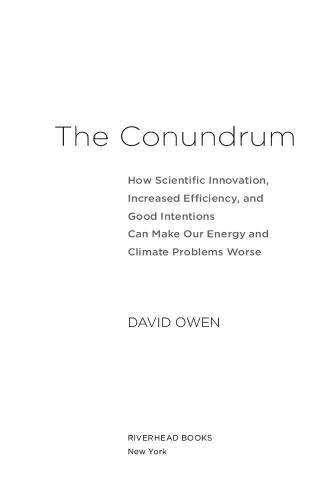
The Conundrum
کتاب های مرتبط
- اطلاعات
- نقد و بررسی
- دیدگاه کاربران
نقد و بررسی

December 5, 2011
New Yorker staff writer Owen (Green Metropolis) takes a penetrating look at the earth’s shrinking and misappropriated resources and the delusion underlying our solutions to these problems. In the process, he persuades us that the serious environmental problems that humanity faces won’t be fixed by scientists and engineers, but by our behavioral changes, namely consuming less. Owen’s latest becomes a declaration against the massive greenwashing campaigns of the past decade and the presentation of scientific data that lets us ignore questions we already know the answers to and don’t like. Owen admonishes locavorism, excoriates solar panels, lambasts natural gas as a substitute for coal, faults compact fluorescent lights, and upbraids innovations in transit. As Owen notes, “efficiency initiatives make no sense, as an environmental strategy, unless they’re preceded—and more than negated—by measures that force major cuts in total energy use.” The book examines reality by taking a contrarian approach, exploring solutions generated by a wind think tank and wind lab. The crusading author zooms out to see the entire picture, noting that “what appear at the time to be valuable environmental breakthroughs often turn out to be long-term disasters in the making.”

January 1, 2012
Americans talk a good game when it comes to environmental responsibility, but all we care about is the price of gas. Is there any news in the observation that the road to hell is paved with good intentions? Probably not, though New Yorker staffer Owen, who established his credentials as an environmental scold with Green Metropolis (2009), seems surprised and irritated to learn that there are trade-offs involved in trying to live responsibly in the world. Take those pesky Vermonters, for instance, who think of themselves as solid citizens on their back-to-the-land organic farms, but who drive 10 times more than urban New Yorkers. Or take the advocates of high-speed trains between, say, San Francisco and Los Angeles, who aren't solving anything by encouraging Californians to travel faster on the way to whatever it is they're up to. Owen--who holds New York City as a model for most things--thrives on the straw man: Put a solar panel array on your roof, he suggests, and you'll start leaving your lights on throughout the day just because you have the illusion of free power for the burning. As for those customers on high-speed trains? Well, the minute they took their cars off the interstate, someone else, sensing the lessening in traffic, would come along to take their place. A little of this contrarian stuff goes a very long way. Owen does make useful points by encouraging us to reframe problems of the environment more precisely--urging, for instance, that the key to protecting wilderness is to make cities livable enough that people want to stay in them rather than out in the sticks and "not to encourage sprawl by treating cities as soul destroyers." But that's an old argument: Read Jane Jacobs, Lewis Mumford or J.B. Jackson for the particulars. Readers seeking environmental snark will enjoy the book. Others, probably not.
(COPYRIGHT (2012) KIRKUS REVIEWS/NIELSEN BUSINESS MEDIA, INC. ALL RIGHTS RESERVED.)

Starred review from February 15, 2012
After Green Metropolis (2009), a revelatory exposition of why urban life is green, Owenbrisk, funny, elucidating, and bluntilluminates a wide spectrum of environmental misperceptions in this even more paradox-laden inquiry. An enthusiastic wrangler of facts, Owen presents disconcerting statistics. Take the BP Gulf oil spill: The average flow rate from the BP wellhead was fifty-five-thousand barrels a day. . . . Americans use that much every four minutes. He calls us out on our tendency to delude ourselves about easy solutions to complicated problems and declares that our failure to do what needs to be done to reduce fossil-fuel consumption is the result of reluctance, not ignorance. In truth, we already know enough, and we have for a long time. We just don't like the answers. That's the conundrum. He recites this mantra, That's the conundrum, while explaining why traffic congestion is a good thing and organic farming is not, and while presenting, with wit and precision, mind-boggling yet crucial information about the ruinous consequences of outdoor artificial light, refrigeration, the gargantuan amount of energy burned to give us all access to the Internet, and hydrofracking for natural gas. By replacing fuzzy green dreams with rigorous analysis and clear-eyed realism, Owen enables us to proceed on firmer ground.(Reprinted with permission of Booklist, copyright 2012, American Library Association.)

























دیدگاه کاربران